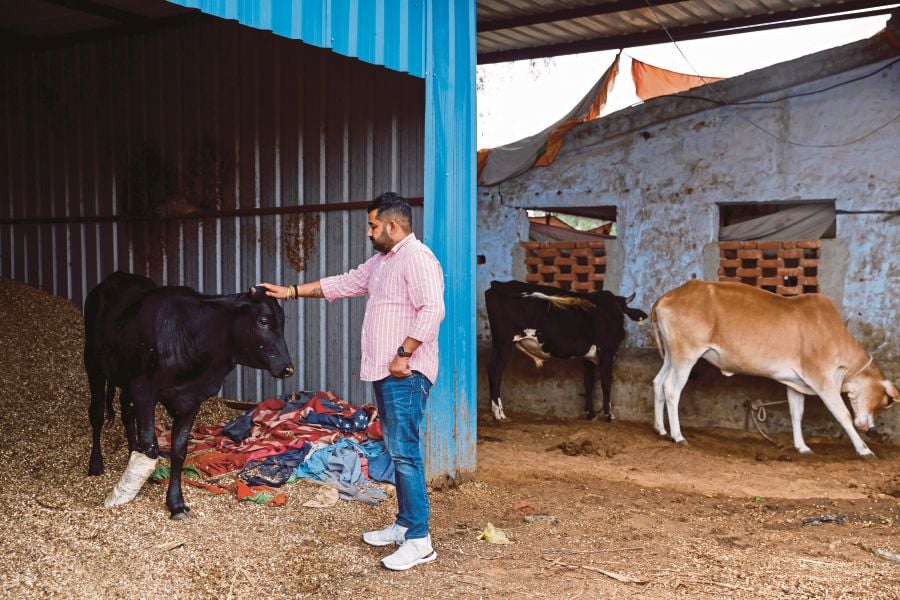VISHNU Dabad attributes his rise from poverty to powerful local politician to an animal: the cow.
The 30-year-old is one of many Gau Rakshaks, or cow protectors: activists who have taken Indian laws banning cattle slaughter and beef consumption into their own hands since Prime Minister Narendra Modi came to power in 2014 at the head of the Hindu nationalist Bharatiya Janata Party (BJP).
Scores of cow protectors in recent years have been accused of using violence to carry out extra-judicial activities, often finding themselves at odds with law enforcement, even as many won acclaim for defending the Hindu faith.
Now some of these operatives are transferring their clout to grassroots political power, where they are pursuing a hardline majoritarian agenda, according to interviews with more than 90 activist-vigilantes, as well as senior leaders of the BJP and other parties, government officials and political analysts.
They described how cow vigilantism has become a finishing school for the young men who mobilise large groups against alleged cattle smugglers and used the resulting popularity to catapult into politics.
Many are campaigning and preparing for elections in 2024 that the BJP and allied right-wing parties are favoured to do well in.
Forty-one cow protectors who spoke to Reuters have been elected to positions — such as village chief, town council member or local legislator — in the past six years, roles that can involve governing tens of thousands of people.
Another 12 said they were lobbying their family members to seek local office.
"All of what you see — my success, my existence — is only because cows have blessed me," said Dabad, who started a cow protection force in 2014 and was elected as village chief in 2016.
He is now a full-time political campaigner in the northern state of Haryana for a party allied with the BJP, and is keen to seek higher office.
Ancient Hindu religious texts praise cows, which are regarded as deities, for their nurturing ability.
But India's minority Muslims and Christians, as well as some Hindus, consume beef as part of their diet, generating sectarian tensions.
There is no publicly available official estimate on the number of cow activists nationwide, but activist leaders said they believe more than 300,000 Hindu men in the nation of 1.4 billion are directly involved with their groups.
India's Interior Ministry, which oversees national law enforcement, did not return a request for comment on that figure or the role of cow activists.
Reuters previously reported that some of them have stopped cow traders, many of them Muslim men, with deadly force, according to prosecutors, witnesses and the families of victims.
Some states have enacted laws enabling cow vigilantes to patrol alongside police.
Human Rights Watch found that at least 44 people, 36 of them Muslims, were killed in cow-related violence between May 2015 and December 2018.
The independent New Delhi-based Documentation of the Oppressed database found 206 acts of cow-related violence involving 850 victims, mainly Muslims, between July 2014 and August 2022.
Cow protectors "are very powerful men and there is a climate of fear", said Jaan Mohammed, a Muslim man whose brother was one of the first victims of a cow-related lynching after Modi took power.
"I don't think this can ever change now."
Legal proceedings are pending. Seventeen men accused of involvement in his brother's 2015 killing were released on bail, and another suspect later died.
Police at the time of the slaying said the alleged perpetrators behaved as if they had a "licence to kill".
Modi has repeatedly criticised activists who engage in "criminal" violence, even as his party courts their support.
Half of India's 36 states and union territories have partial or complete bans on cow slaughter, most of them governed by the BJP. But enforcement has often fallen into the hands of activists.
By posting videos of their raids on alleged cow smugglers on social media, they have mobilised money, as well as thousands of Hindu men.
Religious cow protection movements have a long history in India, but many activists, including Dabad, said they were emboldened by Modi's 2014 victory.
An Interior Ministry official, who was interviewed on condition of anonymity, said: "Even politicians feel threatened by the enormous network of cow vigilantes. They have become a force of their own."
The writer is from Reuters


